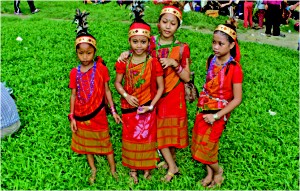
Constitutional recognition of indigenous people
Dr. Abdullah Al Faruque
 |
Photo: Amirul Rajiv |
THE issue of constitutional recognition of indigenous peoples in Bangladesh, raised by indigenous people themselves and civil society, has attracted considerable attention and generated debate in recent times. The main thesis of this demand rests on the argument that indigenous people should be recognised in the constitution by virtue of their being indigenous. However, many argue that this demand is contentious, largely because it is incompatible with the concept of equality of rights. This small write up is an attempt to argue against such contention and defend the demand of the constitutional recognition of indigenous people.
Debate concerning recognition of indigenous people takes place within the context of the continuing oppression of indigenous minorities within the modern States. In fact, constitutional recognition is considered as a valuable tool of promoting and protecting the rights of indigenous people. The constitutional and legislative measure are frequently used as means for adopting affirmative action policies and programmes, which are particularly beneficial to the indigenous groups. The legislative and constitutional mechanism is also important for promoting international human rights norms relating to indigenous people, as these norms can only be implemented at the national level through their incorporation as laws in the constitution. Indeed, recognition of indigenous people's rights is an essential element of democratic and plural society, not an exception.
Over the last decades, many countries have either reformed their constitution, laws or adopted new legislation for conferring rights on indigenous people in the form of affirmative action as well as implementing international norms. For example, the constitution of Argentina of 1994 directs the Congress of Argentina, inter alia, to guarantee respect for the cultural identity of indigenous people, to recognise the juridical personality of indigenous communities, and to secure their ancestral land rights.
In Colombia, the 1991 Constitution, drafted with significant indigenous input, constitutes a major breakthrough in conferring rights to indigenous people. It recognises and protects the ethnic and cultural diversity of the Colombia nation. It affords indigenous communities a high degree of political and administrative autonomy; respect for their institutions of self-government is guaranteed, including indigenous courts applying traditional customary standards. Their collective property rights are recognised; native language and dialectics are made official in indigenous territories; education in these territories is to be bilingual and must be directed to preserve and develop indigenous cultural identity.
The 1988 constitution of Brazil prescribed that the Indians shall have permanent possession of land, and the exclusive usufruct of the natural resources and of all useful things that have been traditionally occupied by them.
The Russian Constitution of 1995 expressly accords human rights to indigenous people under international law. In Canada, indigenous rights are protected n section 25 of the Canadian Charter of Rights and Freedoms, 1982.
In Venezuela, article 77 of the Constitution of 1961 establishes the principle of special protection for the indigenous peoples in order to facilitate their inclusion in the life of the nation.
 |
Photo: K M Asad/Drik News |
Nicaragua's Political Constitution adopted by the Sandinista government in the mid-1980s recognised the communal property and cultural rights of the indigenous peoples of the Atlantic Coast.
In Guatemala, the 1995 UN-sponsored Agreement on Identity and Rights of Indigenous Peoples, references a State obligation under the Guatemalan Constitution to give special protection to co-operative, communal or collectively held lands.
In Papua New Guinea, its 1975 Constitution recognises the customary laws of the various indigenous groupings as binding parts of the national legal system.
It is evident that constitutional and legislative measures are recognised as important means of protecting and promotion of indigenous peoples' right in many parts of the world and they offer special developmental programme to the cause of indigenous people.
The necessity for special regime of indigenous rights can be explained by the fact that they require special legal protection and institutions to protect them within nation state and international community. Moral and ethical aspects of human rights discourse dictates that indigenous people should be portrayed as groups of human beings with fundamental human rights as well as special kind of rights as remedial measures for historical reasons. The existing norms of indigenous rights merely establish the benchmarks for ensuring their minimum range of choices to which indigenous peoples are entitled in remedial-constitutive settings in the governing institutional order.
The philosophical justification of recognising rights of indigenous people can be attributed to at least following reasons: first, indigenous peoples' rights are pre-existing rights in the sense that they are not derived from the legal systems of the states, but arise sui generis from the historical conditions of indigenous peoples as distinct societies with the aspiration to survive as such. In other words, indigenous peoples enjoyed nationhood prior to their subjugation by colonial powers or settlers and their statehood and sovereignty enjoyed under a nation state predate the modern nation states which now assert sovereignty over them.
Second, they should be given some preferential treatment either as compensation for historical suffering and a disproportionately disadvantaged present condition. This preferential treatment has been described as 'restorative paradigm', which suggests that despite variations in the specific political and historical circumstances surrounding them, nearly all indigenous groups share a common set of problems and their claims to land, group equality, culture, and development stem from the right to reparations for the historical injustices against them. The restorative rights should be given to them as a direct consequence of European colonial expansion, by which indigenous people have been deprived of their independence, and their land and their right to choose their role in the modern state. An important dimension of the restorative paradigm is that the indigenous people, who have been persecuted, should be acknowledged as a group and should be provided with appropriate compensation for the injustice and oppression inflicted upon them.
 |
Photo: Amirul Rajiv |
The question as to who are indigenous peoples and by which criteria they should be defined has generated a great deal of controversy. This reflects a lack of consensus within the international community as to the meaning of indigenous peoples with the result that there is as such currently no universal definition of what constitutes an indigenous people. The problem of defining indigenous peoples remains one of the unresolved issues that create an obstacle to the effective implementation of indigenous peoples' rights.
At the international level, international organisations have attempted to clarify this definitional problem. A widely used and well-known definition of indigenous people has been given by Jose Martinez Cobo, Special Rapporteur of the United Nations, which is also popularly known as the 'Cobo definition'. According to 'Cobo's' definition, indigenous peoples are: “Indigenous communities, peoples and nations are those which, having a historical continuity with pre-invasion and pre-colonial societies that developed on their territories, consider themselves distinct from other sectors of the societies now prevailing in those territories, or parts of them. They form at present non-dominant sectors of society and are determined to preserve, develop and transmit to future generations their ancestral territories, and their ethnic identity, as the basis of their continued existence as peoples, in accordance with their own cultural patters, social institutions and legal systems.”
The Cobo definition is well-accepted and is considered as the most comprehensive one. The current definition of indigenous people takes into account the common traits found in most indigenous populations, instead of focusing on the peculiarities of each indigenous group. It stresses an indigenous population's need for cultural protection and their ties to their territory as original occupiers of the land.
 |
Photo: Munir uz Zaman/Drik News |
Other international institutions have also attempted to define indigenous peoples. The World Bank for example has adopted a functional approach to the definition of indigenous peoples, rejecting the criteria-based approach of historical continuity and colonialism. Rather, it has taken a functional view of “indigenous peoples” as groups with a social and cultural identity distinct from the dominant society that makes them vulnerable to being disadvantaged in the development process. The UN Declaration on the Rights of Indigenous People, 2007, however, contains no explicit definition of indigenous people. Rather it elaborates a catalogue of rights for indigenous people as a set of special group rights. But it adopts both defining elements- historical continuity or pre-colonial context, and functional approach of distinct social and cultural identity from the dominant society.
From the above discussion, it is clear that indigenous peoples can be defined as a group of peoples who share common characteristics and cultural and social world views that distinguish them from other population groups. Thus, defining indigenous people only in pre-existing or historical continuity is increasingly negated by recent trends of international law.
Many indigenous communities have been living in the country for centuries in Bangladesh. The constitution of Bangladesh has already accorded preferential treatment to the backward sections of the people which also include indigenous people or ethnic minority. According recognition of indigenous people in the Constitution of Bangladesh will not incur additional cost on the Government, rather it will act as a confidence building measure between the mainstream society and indigenous communities. Furthermore, it will afford greater protection to their rights and interests, not curtailing those of the mainstream people. The constitutional recognition of indigenous people will also facilitate the development of their own communities and cultures within a state formation, and will be useful instrument to prevent the colonizing tendency of dominant cultures.
The recognition is a must to end discrimination and repression against the indigenous communities in Dr. Abdullah Al Faruque is an Associate Professor, Department of Law, University of Chittagong and can be contacted at faruquecu71@yahoo.com the country The recognition is a must to end discrimination and repression against the indigenous communities in the country.
The writer is an Associate Professor, Department of Law, University of Chittagong.